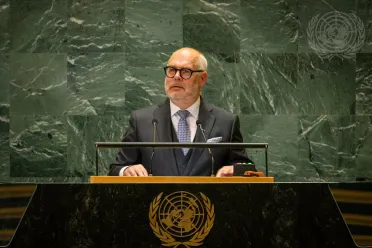Statement
Statement summary
ALAR KARIS, President of Estonia said: “I want to live in a world that is in peace,” where sovereign nations, whether big or small, are not conquered and colonized; where artificial intelligence serves and not hinders humanity; and where nobody has to fear oppression based on gender, race, nation beliefs or one's thoughts. Regrettably peace and freedom are under threat, he said, noting that the number of countries where political rights and civil liberties are diminishing is more than twofold in comparison to those where such freedoms are improving. The international community may condemn brutal acts of violence but without efficient action against atrocities, it is not enough. What “keeps us awake at night”, he said, is the children who are lost to conflicts, who will never be old enough to see a high school diploma or learn how to ride a bike. The happiness of a child is the image that should set the moral compass of the international community, he said.
Stressing the importance of restoring the credibility of the UN, he said now more than ever it is vital to reform the Security Council. Commending the Pact for the Future as a good guideline, he said “we should have been even more ambitious”. The future Council must be efficient, open and accountable and its composition must adequately reflect the current world. The scope and use of the veto right has to be limited, he said, expressing support for all efforts to limit its use, especially on actions aimed at ending or preventing mass atrocities. It is impossible to restore the credibility of the UN when a permanent Council member acts against the UN Charter principles, he said, adding “therefore, let us use wisely the powers of the General Assembly”. Calling on delegates to analyse options to ensure that the Assembly gains more prominence, he added that future peace operations must better respond to existing challenges and emerging realities.
The Russian Federation's aggression against Ukraine, he said, causes inhumane suffering, as does the war in Gaza and other conflicts. Since the horrific terrorist attack by Hamas against Israel almost a year ago, there has been too much suffering in Gaza and the region. The two-State solution is the only way to a just and lasting peace, he stressed. Noting how the global community has condemned the Russian Federation’s aggression against Ukraine “in this very room”, he said it must also firmly condemn the actions of those who arm that country in this aggression — Iran and Democratic People’s Republic of Korea. “Russia’s war against Ukraine is as clear as black and white. Russia is the aggressor and Ukraine is the victim,” he stressed, adding that the “smooth talk about dialogue” and calls on the two countries to engage in direct peace talks is only supporting Russian Federation’s cause. “We are not going to call Russia for a coffee,” he said, calling on that country to accept Ukraine’s 10-point peace formula.
Highlighting his country’s “Fit for Freedom” proposal from last year, he said it calls for a global discussion on how to reinforce multilateralism, how to foster inclusive decision-making of all States and how to ensure human rights and freedoms for all. Estonia’s own story is a perfect illustration that positive change is possible, he said, adding: “We have built a digital, cybersecure society where citizens feel that they themselves are the State.” While free societies might need “some updates from time to time and the latest plugins for optimized user-friendly performance”, if maintained properly they are not crashing and freezing like autocracies, he said. “Estonians have a vivid memory of the times when human rights were denied to us,” he said, adding that this makes the country vigorous, reinforces its commitment to fighting for and to supporting those fighting for their rights today. As a candidate for the UN Human Rights Council for 2026-2028, it stands in alignment with the principle of universality and indivisibility of human rights.
Full statement
Read the full statement, in PDF format.
Photo

Previous sessions
Access the statements from previous sessions.
